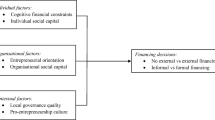Abstract
Analysis of data from the 1982Characteristics of Business Owners Survey reveals that there are some differences between the social capital (social resources available from group support networks) of black business owners and those of other ethnic groups. Black owners have had less exposure to entrepreneurial role models and training in firms run by close relatives than Asian, Hispanic, or nonminority male owners. They do not rely on their relatives or friends for business loans to the same extent as Asians, and show less such reliance than the other groups as well. Black owners compare favorably with Hispanics and nonminority males in using family funds as a source of nonborrowed capital, but are behind Asians. Black firms are relatively more likely to sell to minority customers and hire minority employees. Finally, black owners are the least likely to be married, which indicates some diminished help from the family, a key institution in group support networks.
Similar content being viewed by others
Notes
Frank A. Fratoe, “A Sociological Analysis of Minority Business,”The Review of Black Political Economy 15 (Fall 1986), pp. 5–29.
Fratoe, op. cit.“ The term “social capital” was coined by Glenn C. Loury. See, for example, Glenn C. Loury, “New Dividends Through Social Capital,”Black Enterprise 15 (July 1985), pp. 36–37.
Ivan Light,Ethnic Enterprise in America (Berkeley, Calif.: University of California Press, 1972); Robin Ward and Richard Jenkins,Ethnic Communities in Business (Cambridge, Mass.: Cambridge University Press, 1984); Scott Cummings,Self-Help in Urban America: Patterns of Minority Business Enterprise (New York: Kennikat Press, 1980).
Bureau of the Census,1982 Survey of Minority-Owned Business Enterprises, MB82-1, Minority-Owned Businesses—Black (Washington, D.C.: U.S. Department of Commerce, August 1985).
Bureau of the Census, op. cit.; Derek T. Dingle, “Finding A Prescription for Black Wealth,”Black Enterprise 17 (January 1987), pp. 38–48.
E. Franklin Frazier,Black Bourgeoisie (New York: Free Press, 1957); Eugene P. Foley, “The Negro Businessman: In Search of a Tradition,”Daedalus 95 (Winter 1966), pp. 107–144; Nathan Glazer and Daniel P. Moynihan,Beyond the Melting Pot (Cambridge, Mass.: MIT Press, 1963); Thomas Sowell,Ethnic America: A History (New York: Basic Books, 1981).
See the argument advanced by Joel Kotkin,Inc. (September 1986), pp. 81-86.
Bureau of the Census,1982 Characteristics of Business Owners CB082-1, (Washington, D.C.: U.S. Department of Commerce, August 1987). See this publication for a description of the CBO survey.
Albert Shapero and Lisa Sokol, “The Social Dimensions of Entrepreneurship,” in Calvin A. Kent, et. al. (eds.),Encyclopedia of Entrepreneurship (Englewood, N.J.: Prentice-Hall, 1982), pp. 72–90; Fratoe, op. cit.; Foley, op. cit.; Frazier, op. cit.; James W. Loewen,The Mississippi Chinese: Between Black and White (Cambridge, Mass.: Harvard University Press, 1971).
Fratoe, op. cit.“; Foley, op. cit.
Loewen, op. cit.; Light, op. cit.; Edna Bonacich, et. al., “Koreans in Small Business,”Society 14 (Sept./Oct. 1977), pp. 54-59; Illsoo Kim,New Urban Immigrants: The Korean Community in New York (Princeton, N.J.: Princeton University Press, 1981).
Light, op. cit.; Charles C. Wong, “Black and Chinese Grocery Stores in Los Angeles’ Black Ghetto,”Urban Life 5 (January 1977), pp. 439–464.
Light, op. cit.; Loewen, op. cit.; Wong, op. cit.
St. Clair Drake and Horace Cayton,Black Metropolis: A Study of Negro Life in a Northern City, 2nd. ed. (New York: Harcourt, Brace, and World, 1962); Foley, op. cit.; David Caplovitz,The Merchants of Harlem (New York: Sage, 1973); Franklin D. Wilson, “The Ecology of A Black Business District,”Review of Black Political Economy 5 (Summer 1975), pp. 353-375; Kenneth Wilson and W. Allen Martin, “Ethnic Enclaves: A Comparison of the Cuban and Black Economies in Miami,”American Journal of Sociology 88 (July 1982), pp. 135-160.
Howard Aldrich, et. al., “Business Development and Self-Segregation: Asian Enterprise in Three British Cities,” in Ceri Peach, et. al. (eds.),Ethnic Segregation in Cities (Athens, Ga: University of Georgia Press, 1981), pp. 170–189; Drake and Cayton, op. cit.; Thomas Sowell,Race and Economics (New York: David McKay, 1975); Fratoe, op. cit.
Franklin D. Wilson, op. cit.; Drake and Cayton, op. cit.; J.H. Harman, et. al.,The Negro As Businessman, 2nd. ed. (College Park, Md.: McGrath Publishing, 1969); Vishnu Oak,The Negro’s Adventure in General Business (Yellow Springs, Ohio: Antioch Press, 1949).
Fratoe, op. cit.“; Cummings, op. cit.; Ward and Jenkins, op. cit.; Roger Waldinger,Through the Eye of the Needle: Immigrants and Enterprise in New York’s Garment Trades (New York: New York University Press, 1986).
James F. DeCarlo and Paul R. Lyons, “A Comparison of Selected Personal Characteristics of Minority and Non-Minority Female Entrepreneurs,”Journal of Small Business Management 17 (October 1979), pp. 22–29; Kent Gilbreath,Red Capitalism: An Analysis of the Navajo Economy (Norman, Okla.: University of Oklahoma Press, 1973); John A. Hornaday and John Aboud, “Characteristics of Successful Entrepreneurs,”Personnel Psychology 24 (Summer 1971), pp. 141–153.
About this article
Cite this article
Fratoe, F.A. Social capital of black business owners. Rev Black Polit Econ 16, 33–50 (1988). https://doi.org/10.1007/BF02892164
Issue Date:
DOI: https://doi.org/10.1007/BF02892164




